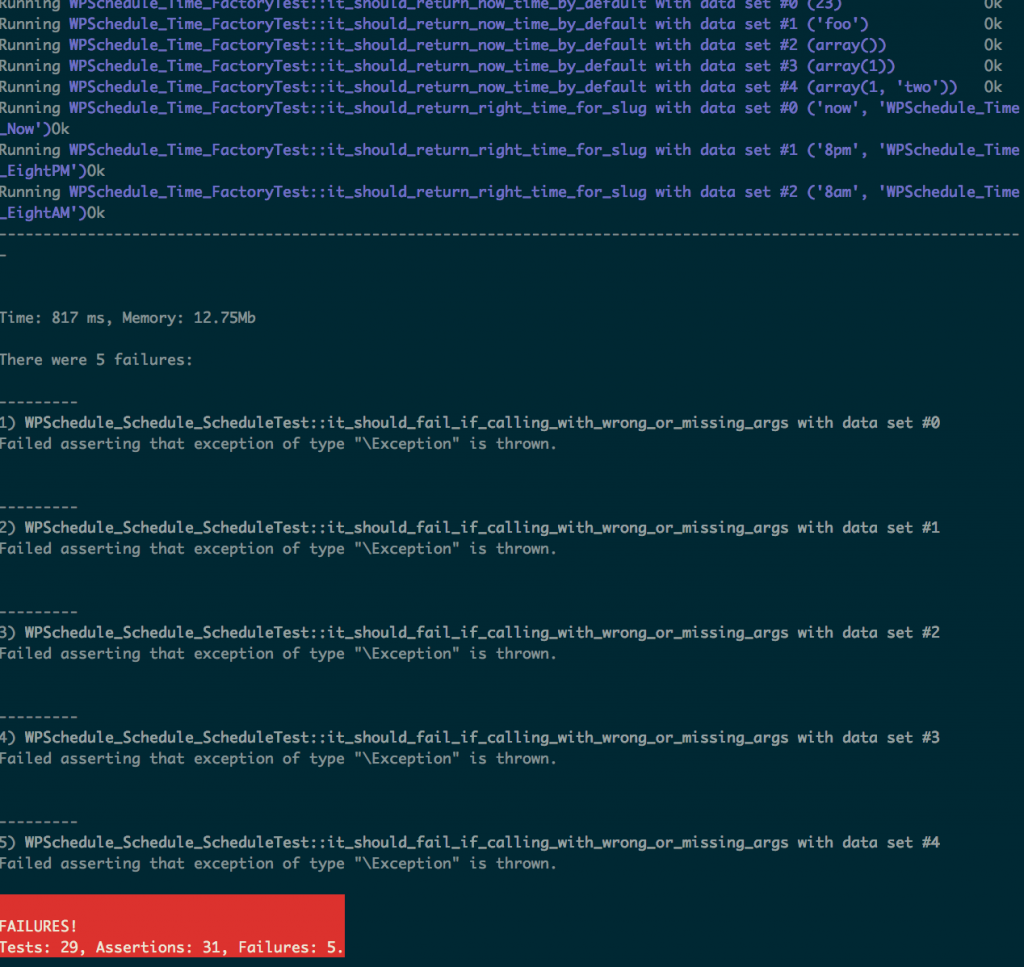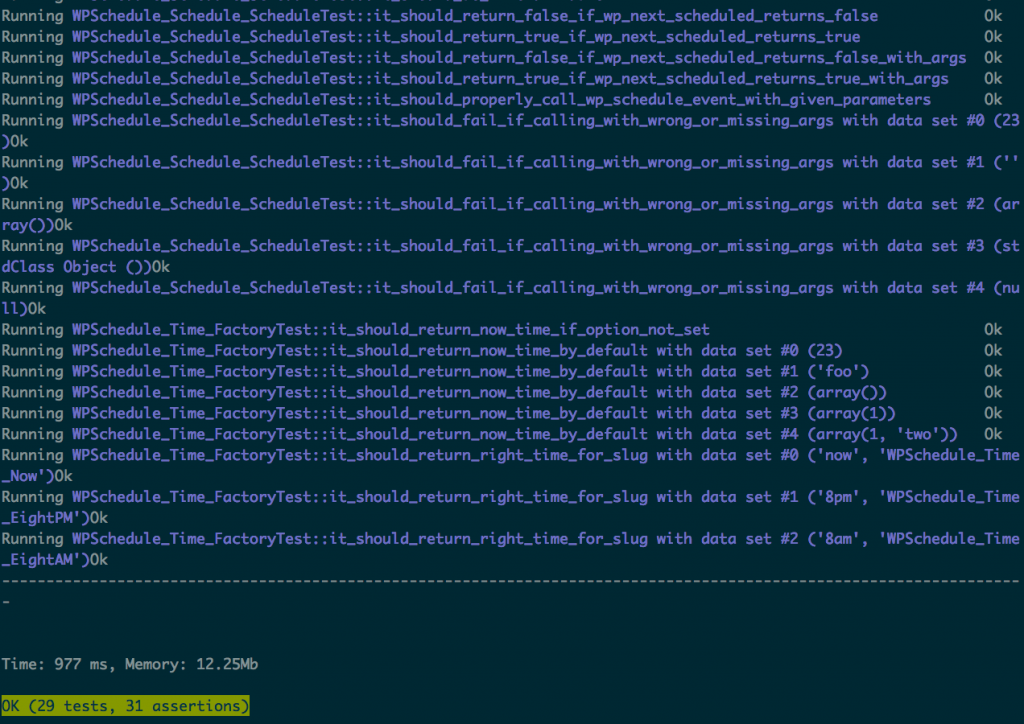Refactoring argument checking
December 18, 2014
Where I test exceptions because bad arguments happen.
Testing for the input
Sadly not all the input to a function or method can be type-hinted and implicitly checked for conformity.
Getting back to the WPSchedule_Schedule_Schedule class, the star of the wp-schedule show, I want to test that the method schedule will throw an Exception when the hook name is not a string or is an empty string; right now the method is not complicated at all
public function schedule( WPSchedule_Time_TimeInterface $activation_time, WPSchedule_Interval_IntervalInterface $recurrence_interval, $hook, array $args = null ) {
wp_schedule_event( $activation_time->getTime(), $recurrence_interval->getInterval(), $hook, $args );
}
but, beside for time and interval type hinting, the $hook argument could be anything.
I've set up a test method and a corresponding test provider for the purpose
public function badHookArgs() {
return [
[ 23 ],
[ '' ],
[ array() ],
[ new stdClass() ],
[ null ]
];
}
/**
* @test
* it should fail if calling with wrong or missing args
* @dataProvider badHookArgs
*/
public function it_should_fail_if_calling_with_wrong_or_missing_args( $badHookArg ) {
$now = time();
$time = FunctionMocker::replace( '\WPSchedule_Time_TimeInterface::getTime', $now );
$interval = FunctionMocker::replace( '\WPSchedule_Interval_IntervalInterface::getInterval', 500 );
$this->setExpectedException( '\Exception' );
$this->sut->schedule( $time, $interval, $badHookArg );
}
Where the test provider method will allow me to add tests at pleasure later should the need arise.
Without any check in place the tests will fail [ ](http://theaveragedev.local/wordpress/wp-content/uploads/2014/12/2014-12-18-at-18.15.png)
](http://theaveragedev.local/wordpress/wp-content/uploads/2014/12/2014-12-18-at-18.15.png)
Evolving the argument check
First line of defense is adding a check for the $hook arg in the schedule method
public function schedule( WPSchedule_Time_TimeInterface $activation_time, WPSchedule_Interval_IntervalInterface $recurrence_interval, $hook, array $args = null ) {
if ( ! is_string( $hook ) || empty( $hook ) ) {
throw new Exception( 'Hook name must be a non empty string' );
}
wp_schedule_event( $activation_time->getTime(), $recurrence_interval->getInterval(), $hook, $args );
}
and that will do it [ ](http://theaveragedev.local/wordpress/wp-content/uploads/2014/12/2014-12-18-at-18.19.png)
](http://theaveragedev.local/wordpress/wp-content/uploads/2014/12/2014-12-18-at-18.19.png)
Refactoring
The following phase of TDD is refactoring and that I will do to keep code DRY; I will need to check for the $hook argument in any of the class methods accepting it as an argument and it makes sense to create a private method to check for the argument that current and future methods of the class will be able to use; simply moving code I add this method to the class
private function checkHook( $hook ){
if ( ! is_string( $hook ) || empty( $hook ) ) {
throw new Exception( 'Hook name must be a non empty string' );
}
}
and will call it refactoring the schedule method
public function schedule( WPSchedule_Time_TimeInterface $activation_time, WPSchedule_Interval_IntervalInterface $recurrence_interval, $hook, array $args = null ) {
$this->checkHook($hook);
wp_schedule_event( $activation_time->getTime(), $recurrence_interval->getInterval(), $hook, $args );
}
Good laziness
A good thing about TDD is that it makes me lazy: to write code I have to test it so the more code I write the more I have to write tests.
I don't want to write more tests that's needed.
Refactoring the argument checking into a method of its own allows me to test the whole class code, "cover it", without having to test that any method accepting an $hook argument throws if an invalid $hook argument is passed to the method: I just need to test it in one place.
Do I really need to test such trivial code? Probably not right now but might need to do it in the future as the class evolves and the $hook parameter becomes more complex and contextual: in that occurrence I will just need to modify/update the code in one place.
Even more laziness
The version of the project that's on GitHub testifies to my laziness as a TDDer even more: I've developed an argument checking utility class that's PHP 5.2 compatible and that I'm using to make the checks.
The checkHook method evolves to
private function checkHook( $hook ) {
Arg::_( $hook, "Hook name" )->is_string()
->assert( ! empty( $hook ), 'Hook name must be a non empty string' );
}
Which will give the caller a more precise exception.
Why that? Because that class is tested already and I know it will work as intended. Same concept as before, just worse.
Next
Time to wrap up the wp-schedule package.